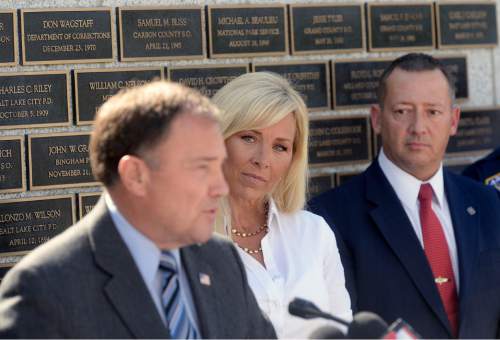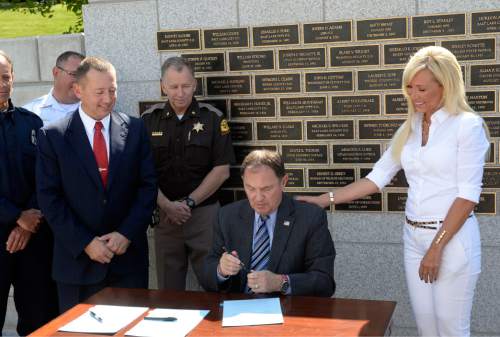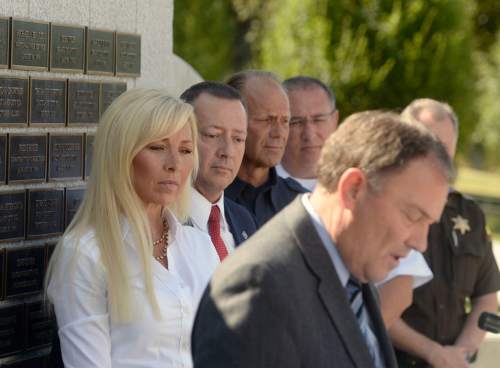This is an archived article that was published on sltrib.com in 2015, and information in the article may be outdated. It is provided only for personal research purposes and may not be reprinted.
After Nannette Wride found out that her police officer husband had been shot and killed in the line of duty, she felt like she was on merry-go-round spinning at a 1,000 mph, and she was the only one standing still.
"You can't think straight. You can't think to take the next breath," Wride said. " … You're so overwhelmed and so numb, and so many things are going through your mind, like, 'How am I going to pick up all these pieces?' And then you get hit with, 'Oh yeah, you don't have any more money' and, 'Oh yeah, you don't have any health insurance' and, 'Oh yeah, there's one more thing and one more thing,' and it just keeps adding and adding on top of everything."
Which is why she's so grateful for HB288, a bill for which she lobbied after the fatal shooting last year of her husband, Utah County Sheriff's Sgt. Cory Wride.
On Wednesday morning, Gov. Gary Herbert ceremonially signed into law the bill, which improves death benefits for families of fallen officers and firefighters.
The law requires that survivors get a lump-sum death benefit equal to six months' pay; they used to receive only $1,500. The law also requires continuing health-insurance coverage for spouses, until they remarry or become eligible for Medicare, and for children up to age 26.
HB288 also sets up a specialist in the governor's office to help survivors handle required paperwork for benefits and other needs.
"We take time to show respect to those who have given the ultimate sacrifice," Herbert said, standing at the Fallen Officers Memorial on the west side of the state Capitol. "That's impressive to me that we have these kind of men and women who are willing to go out there, knowing that may be their fate."
Plaques bearing the names of dozens of such law officers adorned the stone wall behind the governor. On the opposite side from Wride's name was that of Draper Police Sgt. Derek Johnson, who was shot and killed in 2013. His widow, Shante, lobbied with Nannette Wride to pass HB288.
It was the combination of the deaths of Derek Johnson and Cory Wride that brought to light the insufficient benefit coverage provided for their widows.
The bill's sponsor, Rep. Paul Ray, R-Clearfield, said the bill also creates a pool that every city pays into to help smaller agencies fund the newly extended benefits.
"Some cities said if we do this and we lose three guys in a shootout, it's going to financially break us," Ray said. " … So [now] they'll share the cost. It was the big cities that came in and said, 'Hey, let's put a pool together because we're happy to pay for Clinton, we're happy to pay for these little towns so that they can have those benefits.' "
The bill covers only families of fallen officers and firefighters moving forward. It might also set a precedent and help families beyond Utah's borders.
When Nannette Wride was in Washington, D.C., for a national gathering to honor fallen officers, she talked to other widows who had suffered like her.
"Their states don't have things like this," she said. "There are a lot of widows who are wanting to go back and do the exact same thing Shante and I have done with Paul [Ray]."
Twitter: @MikeyPanda









